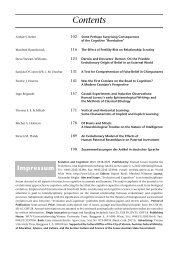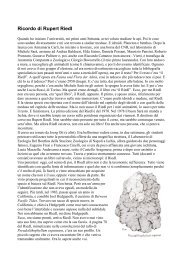The Seven Sins of Evolutionary Psychology - Konrad Lorenz Institute
The Seven Sins of Evolutionary Psychology - Konrad Lorenz Institute
The Seven Sins of Evolutionary Psychology - Konrad Lorenz Institute
You also want an ePaper? Increase the reach of your titles
YUMPU automatically turns print PDFs into web optimized ePapers that Google loves.
Scott Atrangroups <strong>of</strong> species: snake, leopard and cheetah, hawkeagle, and so forth (HAUSER 2000). Chimpanzees mayhave rudimentary hierarchical groupings <strong>of</strong> biologicalgroups within groups (BROWN/BOYSEN in press).To be sure, the world itself is neither chaos nor flux:species are <strong>of</strong>ten locally self-structuring entities thatare reproductively and ecologically isolated fromother species through natural selection. But there isno a priori reason for the mind to always focus oncategorizing and relating species qua species, unlessdoing so served some adaptive function (e.g., itmakes little difference which tiger could eat a personor which mango a person could eat). And the adaptivefunctions <strong>of</strong> organisms rarely, if ever, evolve or operatein nature as all-purpose mechanisms.3. Universality. Ever since the pioneering work <strong>of</strong>BERLIN and his colleagues, evidence from ethnobiologyand experimental psychology has been accumulatingthat all human societies have similar folkbiologicalstructures (BERLIN et al. 1973; BERLIN 1992;ATRAN 1990, 1999). <strong>The</strong>se striking cross-cultural similaritiessuggest that a small number <strong>of</strong> organizingprinciples universally define folkbiological systems.Basic aspects <strong>of</strong> folkbiological structure (e.g., taxonomicranking, primacy <strong>of</strong> generic-species) seem tovary little across cultures as a function <strong>of</strong> theories orbelief systems.4. Ease <strong>of</strong> Acquisition. Acquisition studies indicatea precocious emergence <strong>of</strong> essentialist folkbiologicalprinciples in early childhood that are not applied toother domains (GELMAN/WELLMAN 1991; KEIL 1994;HATANO/INAGAKI 1999; ATRAN et al. 2001).5. Independence from Perceptual Experience.Experiments on inferential processing show thatthat humans do not make biological inductions primarilyon the basis <strong>of</strong> perceptual experience or anygeneral similarity-based metric, but on the basis <strong>of</strong>imperceptible causal expectations <strong>of</strong> a peculiar, essentialistnature (ATRAN et al. 1997; COLEY et al.1997).6. Pathology. Cerebral impairments (WILLIAMS syndrome,brain lesions caused by certain types <strong>of</strong> herpesvirus, etc.) suggest selective retention or loss <strong>of</strong>folkbiological taxonomies or <strong>of</strong> particular taxonomicranks. Neuropsychological studies have reporteda pathological performance in recognition atthe life-form and generic-species levels (e.g., recognizingan item as an animal but not as a bird orrobin), and dissociation at the life-form level (e.g.,not recognizing items as trees). Existing studies,however, do not say anything about the generic-speciesrank as the preferred level <strong>of</strong> representation forreasoning, perhaps because <strong>of</strong> methodology (linkedto averaging over items and failure to include sets <strong>of</strong>generic species) (WARRINGTON/SHALLICE 1984; SAR-TORI/JOB 1988; JOB/SURIAN 1998).7. Inhibition and Hyperactivity. One characteristic<strong>of</strong> an evolved cognitive disposition is evident difficultyin inhibiting its operation (HAUSER 2000).Consider beliefs in biological essences. Such beliefsgreatly help people explore the world by proddingthem to look for regularities and to seek explanations<strong>of</strong> variation in terms <strong>of</strong> underlying patterns.This strategy may help bring order to ordinary circumstances,including those relevant to human survival.But in other circumstances, such as wanting toknow what is correct or true for the cosmos at large,such intuitively ingrained concepts and beliefs mayhinder more than help. For example, the essentialistbias to understand variation in terms <strong>of</strong> deviance isundoubtedly a hindrance to evolutionary thinking.In some everyday matters, the tendency to essentializeor explain variation in terms <strong>of</strong> deviation fromsome essential ideal or norm (e.g., people as mentalor biological ‘deviants’) can be an effortlessly ‘natural’but wrong way to think.Because intuitive notions come to us so naturallythey may be difficult to unlearn and transcend. Evenstudents and philosophers <strong>of</strong> biology <strong>of</strong>ten find itdifficult to abandon commonsense notions <strong>of</strong> speciesas classes, essences or natural kinds in favor <strong>of</strong>the concept <strong>of</strong> species as a logical individual—a genealogicalbranch whose endpoints are somewhat arbitrarilydefined in the phyletic tree and whose statusdoes not differ in principle for that <strong>of</strong> other smaller(variety) and larger (genus) branches. Similarly, racism—theprojection <strong>of</strong> biological essences onto socialgroups—seems to be a cognitively facile and culturallyuniversal tendency (HIRSCHFELD 1996).Although science teaches that race is biologically incoherent,racial or ethnic essentialism is as notoriouslydifficult to suppress as it is easy to incite (GIL-WHITE 2001).8. Cultural Transmission. Human cultures favor arapid selection and stable distribution <strong>of</strong> those ideasthat: 1) readily help to solve relevant and recurrentenvironmental problems, 2) are easily memorizedand processed by the human brain, and 3) facilitatethe retention and understanding <strong>of</strong> ideas that aremore variable (e.g ., religion) or difficult to learnEvolution and Cognition ❘ 52 ❘ 2001, Vol. 7, No. 1








